Effective Communication, Negotiation, and Influence Skills Reflection
VerifiedAdded on 2023/01/06
|8
|2358
|63
Report
AI Summary
This report provides a comprehensive reflection on personal and professional skills, focusing on communication, negotiation, and influencing. It begins with an introduction defining personal and professional skills, emphasizing the importance of communication. The main body includes a detailed reflection on effective communication skills, exploring verbal and non-verbal communication, different types of communicators, and barriers to effective communication. It uses the Gibbs Reflection cycle to analyze personal experiences and workplace behavior. The report also examines negotiation and influencing skills, discussing distributive and integrative negotiation, and the application of these skills to achieve predetermined objectives. The conclusion summarizes the key findings, reiterating the significance of these skills for overall personal and professional development. References to books and journals are included to support the analysis.
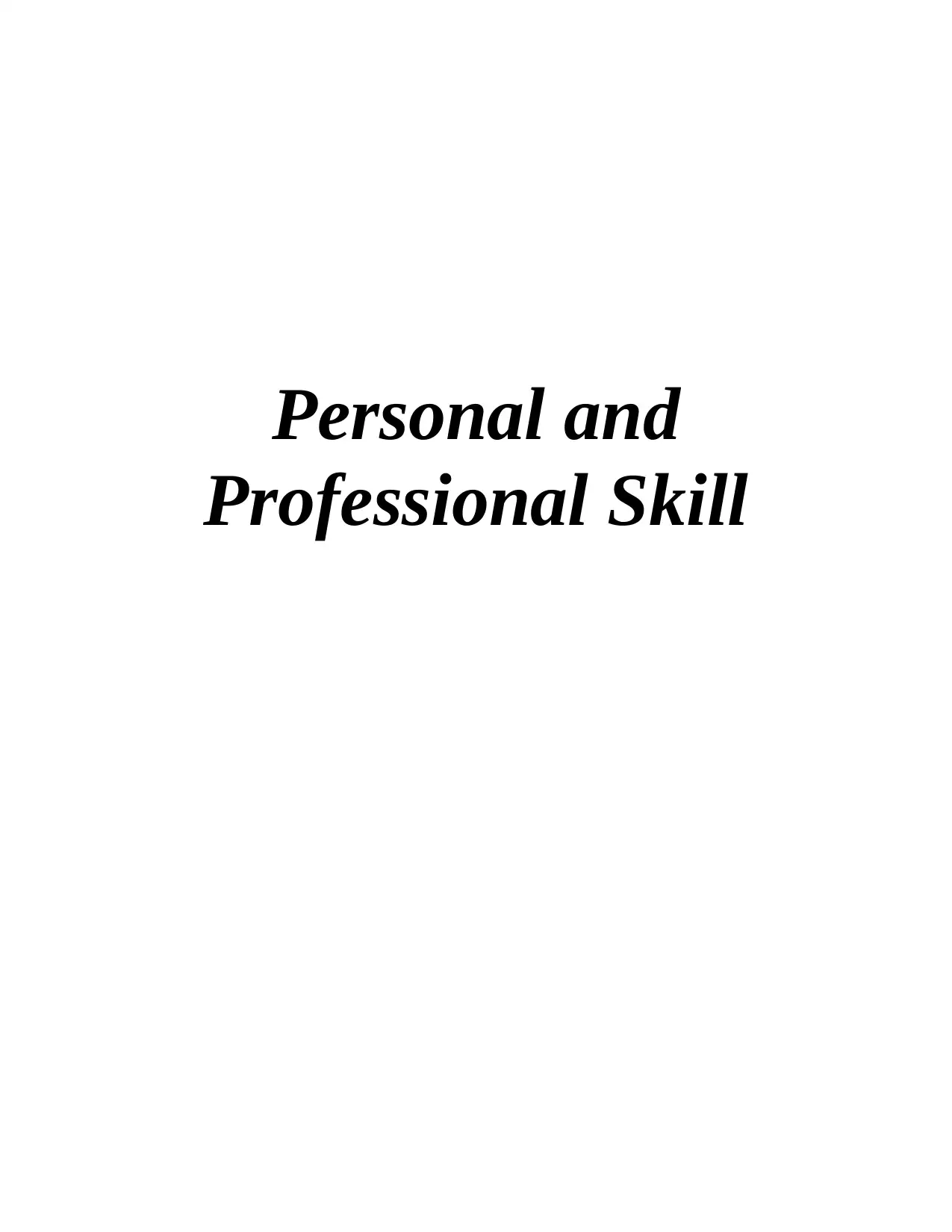
Personal and
Professional Skill
Professional Skill
Paraphrase This Document
Need a fresh take? Get an instant paraphrase of this document with our AI Paraphraser
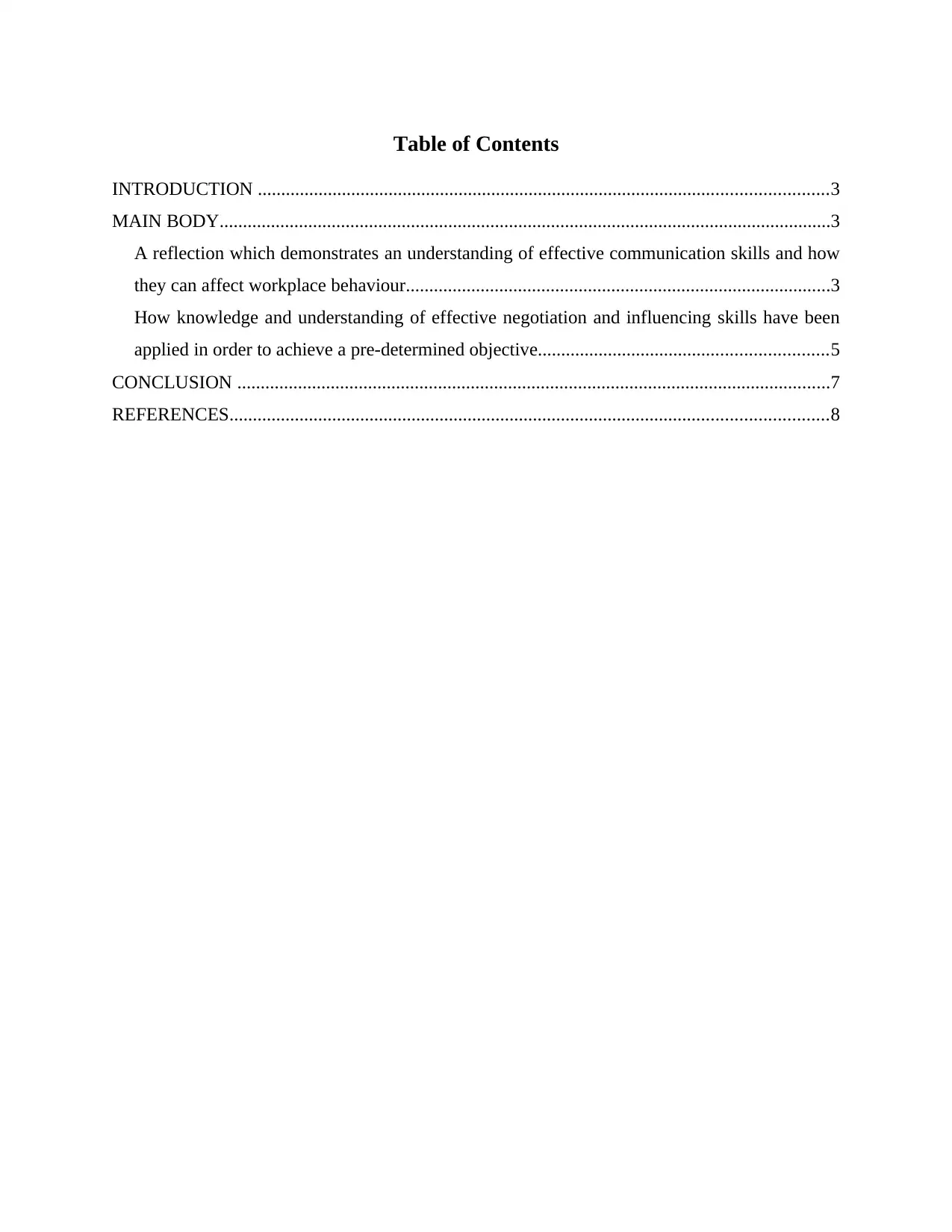
Table of Contents
INTRODUCTION ..........................................................................................................................3
MAIN BODY...................................................................................................................................3
A reflection which demonstrates an understanding of effective communication skills and how
they can affect workplace behaviour...........................................................................................3
How knowledge and understanding of effective negotiation and influencing skills have been
applied in order to achieve a pre-determined objective..............................................................5
CONCLUSION ...............................................................................................................................7
REFERENCES................................................................................................................................8
INTRODUCTION ..........................................................................................................................3
MAIN BODY...................................................................................................................................3
A reflection which demonstrates an understanding of effective communication skills and how
they can affect workplace behaviour...........................................................................................3
How knowledge and understanding of effective negotiation and influencing skills have been
applied in order to achieve a pre-determined objective..............................................................5
CONCLUSION ...............................................................................................................................7
REFERENCES................................................................................................................................8
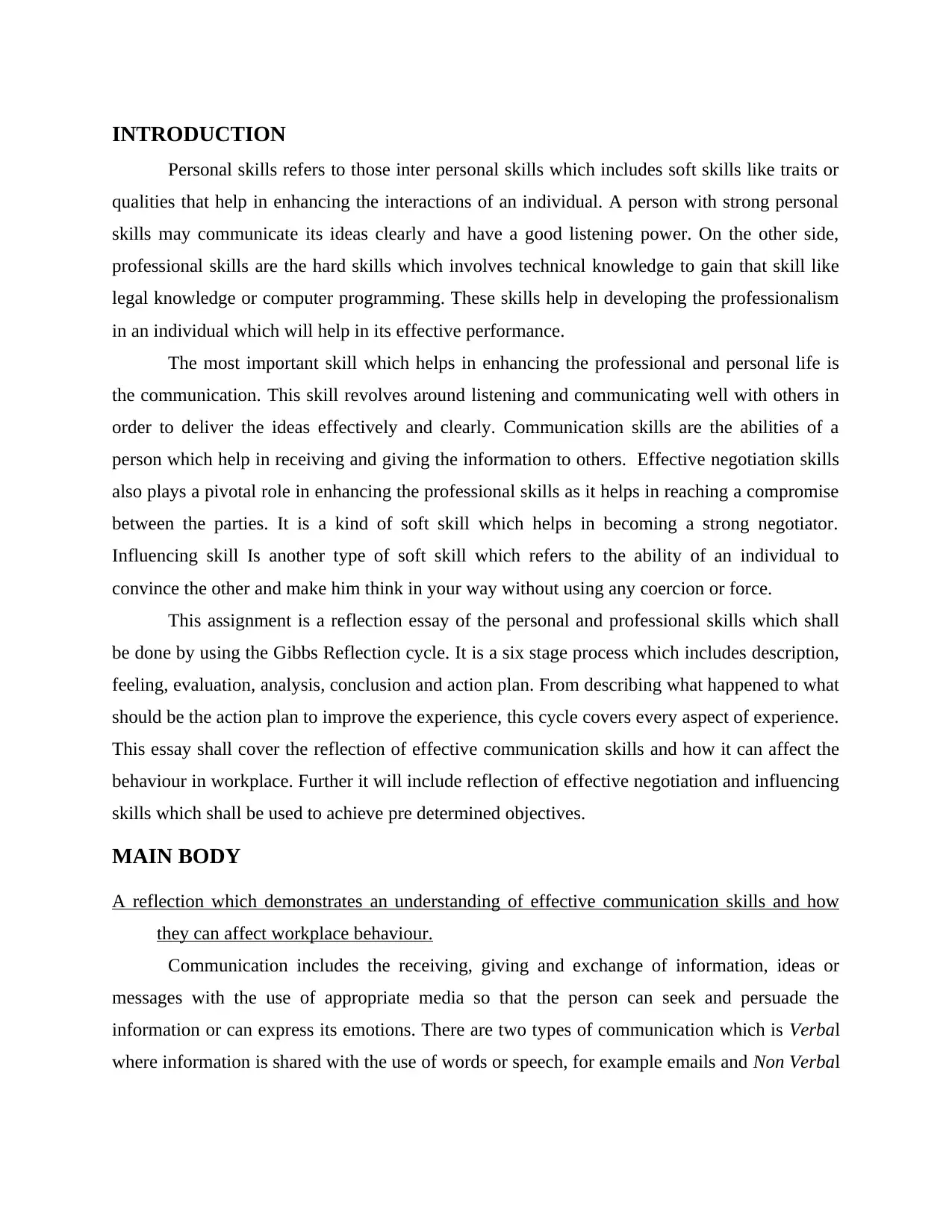
INTRODUCTION
Personal skills refers to those inter personal skills which includes soft skills like traits or
qualities that help in enhancing the interactions of an individual. A person with strong personal
skills may communicate its ideas clearly and have a good listening power. On the other side,
professional skills are the hard skills which involves technical knowledge to gain that skill like
legal knowledge or computer programming. These skills help in developing the professionalism
in an individual which will help in its effective performance.
The most important skill which helps in enhancing the professional and personal life is
the communication. This skill revolves around listening and communicating well with others in
order to deliver the ideas effectively and clearly. Communication skills are the abilities of a
person which help in receiving and giving the information to others. Effective negotiation skills
also plays a pivotal role in enhancing the professional skills as it helps in reaching a compromise
between the parties. It is a kind of soft skill which helps in becoming a strong negotiator.
Influencing skill Is another type of soft skill which refers to the ability of an individual to
convince the other and make him think in your way without using any coercion or force.
This assignment is a reflection essay of the personal and professional skills which shall
be done by using the Gibbs Reflection cycle. It is a six stage process which includes description,
feeling, evaluation, analysis, conclusion and action plan. From describing what happened to what
should be the action plan to improve the experience, this cycle covers every aspect of experience.
This essay shall cover the reflection of effective communication skills and how it can affect the
behaviour in workplace. Further it will include reflection of effective negotiation and influencing
skills which shall be used to achieve pre determined objectives.
MAIN BODY
A reflection which demonstrates an understanding of effective communication skills and how
they can affect workplace behaviour.
Communication includes the receiving, giving and exchange of information, ideas or
messages with the use of appropriate media so that the person can seek and persuade the
information or can express its emotions. There are two types of communication which is Verbal
where information is shared with the use of words or speech, for example emails and Non Verbal
Personal skills refers to those inter personal skills which includes soft skills like traits or
qualities that help in enhancing the interactions of an individual. A person with strong personal
skills may communicate its ideas clearly and have a good listening power. On the other side,
professional skills are the hard skills which involves technical knowledge to gain that skill like
legal knowledge or computer programming. These skills help in developing the professionalism
in an individual which will help in its effective performance.
The most important skill which helps in enhancing the professional and personal life is
the communication. This skill revolves around listening and communicating well with others in
order to deliver the ideas effectively and clearly. Communication skills are the abilities of a
person which help in receiving and giving the information to others. Effective negotiation skills
also plays a pivotal role in enhancing the professional skills as it helps in reaching a compromise
between the parties. It is a kind of soft skill which helps in becoming a strong negotiator.
Influencing skill Is another type of soft skill which refers to the ability of an individual to
convince the other and make him think in your way without using any coercion or force.
This assignment is a reflection essay of the personal and professional skills which shall
be done by using the Gibbs Reflection cycle. It is a six stage process which includes description,
feeling, evaluation, analysis, conclusion and action plan. From describing what happened to what
should be the action plan to improve the experience, this cycle covers every aspect of experience.
This essay shall cover the reflection of effective communication skills and how it can affect the
behaviour in workplace. Further it will include reflection of effective negotiation and influencing
skills which shall be used to achieve pre determined objectives.
MAIN BODY
A reflection which demonstrates an understanding of effective communication skills and how
they can affect workplace behaviour.
Communication includes the receiving, giving and exchange of information, ideas or
messages with the use of appropriate media so that the person can seek and persuade the
information or can express its emotions. There are two types of communication which is Verbal
where information is shared with the use of words or speech, for example emails and Non Verbal
⊘ This is a preview!⊘
Do you want full access?
Subscribe today to unlock all pages.

Trusted by 1+ million students worldwide
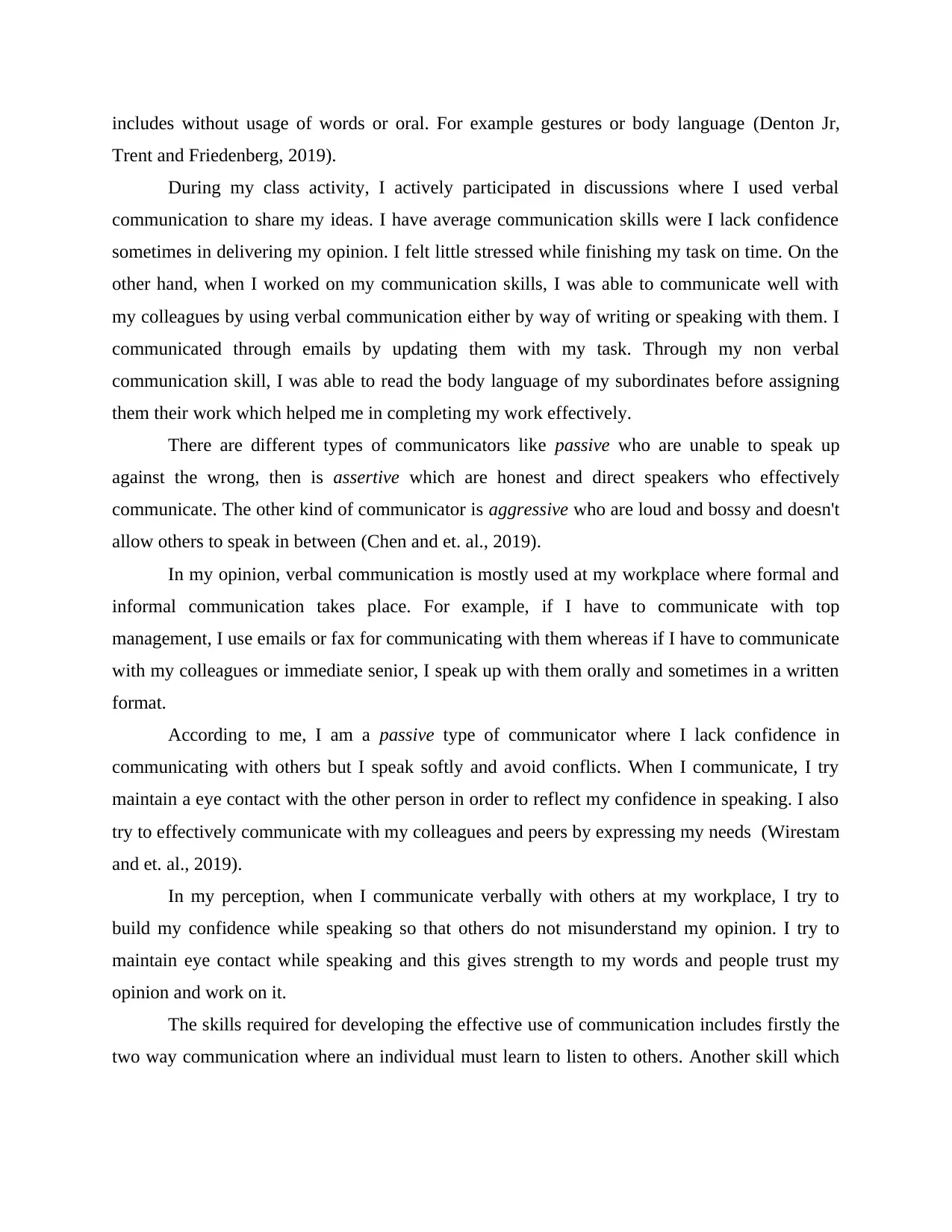
includes without usage of words or oral. For example gestures or body language (Denton Jr,
Trent and Friedenberg, 2019).
During my class activity, I actively participated in discussions where I used verbal
communication to share my ideas. I have average communication skills were I lack confidence
sometimes in delivering my opinion. I felt little stressed while finishing my task on time. On the
other hand, when I worked on my communication skills, I was able to communicate well with
my colleagues by using verbal communication either by way of writing or speaking with them. I
communicated through emails by updating them with my task. Through my non verbal
communication skill, I was able to read the body language of my subordinates before assigning
them their work which helped me in completing my work effectively.
There are different types of communicators like passive who are unable to speak up
against the wrong, then is assertive which are honest and direct speakers who effectively
communicate. The other kind of communicator is aggressive who are loud and bossy and doesn't
allow others to speak in between (Chen and et. al., 2019).
In my opinion, verbal communication is mostly used at my workplace where formal and
informal communication takes place. For example, if I have to communicate with top
management, I use emails or fax for communicating with them whereas if I have to communicate
with my colleagues or immediate senior, I speak up with them orally and sometimes in a written
format.
According to me, I am a passive type of communicator where I lack confidence in
communicating with others but I speak softly and avoid conflicts. When I communicate, I try
maintain a eye contact with the other person in order to reflect my confidence in speaking. I also
try to effectively communicate with my colleagues and peers by expressing my needs (Wirestam
and et. al., 2019).
In my perception, when I communicate verbally with others at my workplace, I try to
build my confidence while speaking so that others do not misunderstand my opinion. I try to
maintain eye contact while speaking and this gives strength to my words and people trust my
opinion and work on it.
The skills required for developing the effective use of communication includes firstly the
two way communication where an individual must learn to listen to others. Another skill which
Trent and Friedenberg, 2019).
During my class activity, I actively participated in discussions where I used verbal
communication to share my ideas. I have average communication skills were I lack confidence
sometimes in delivering my opinion. I felt little stressed while finishing my task on time. On the
other hand, when I worked on my communication skills, I was able to communicate well with
my colleagues by using verbal communication either by way of writing or speaking with them. I
communicated through emails by updating them with my task. Through my non verbal
communication skill, I was able to read the body language of my subordinates before assigning
them their work which helped me in completing my work effectively.
There are different types of communicators like passive who are unable to speak up
against the wrong, then is assertive which are honest and direct speakers who effectively
communicate. The other kind of communicator is aggressive who are loud and bossy and doesn't
allow others to speak in between (Chen and et. al., 2019).
In my opinion, verbal communication is mostly used at my workplace where formal and
informal communication takes place. For example, if I have to communicate with top
management, I use emails or fax for communicating with them whereas if I have to communicate
with my colleagues or immediate senior, I speak up with them orally and sometimes in a written
format.
According to me, I am a passive type of communicator where I lack confidence in
communicating with others but I speak softly and avoid conflicts. When I communicate, I try
maintain a eye contact with the other person in order to reflect my confidence in speaking. I also
try to effectively communicate with my colleagues and peers by expressing my needs (Wirestam
and et. al., 2019).
In my perception, when I communicate verbally with others at my workplace, I try to
build my confidence while speaking so that others do not misunderstand my opinion. I try to
maintain eye contact while speaking and this gives strength to my words and people trust my
opinion and work on it.
The skills required for developing the effective use of communication includes firstly the
two way communication where an individual must learn to listen to others. Another skill which
Paraphrase This Document
Need a fresh take? Get an instant paraphrase of this document with our AI Paraphraser
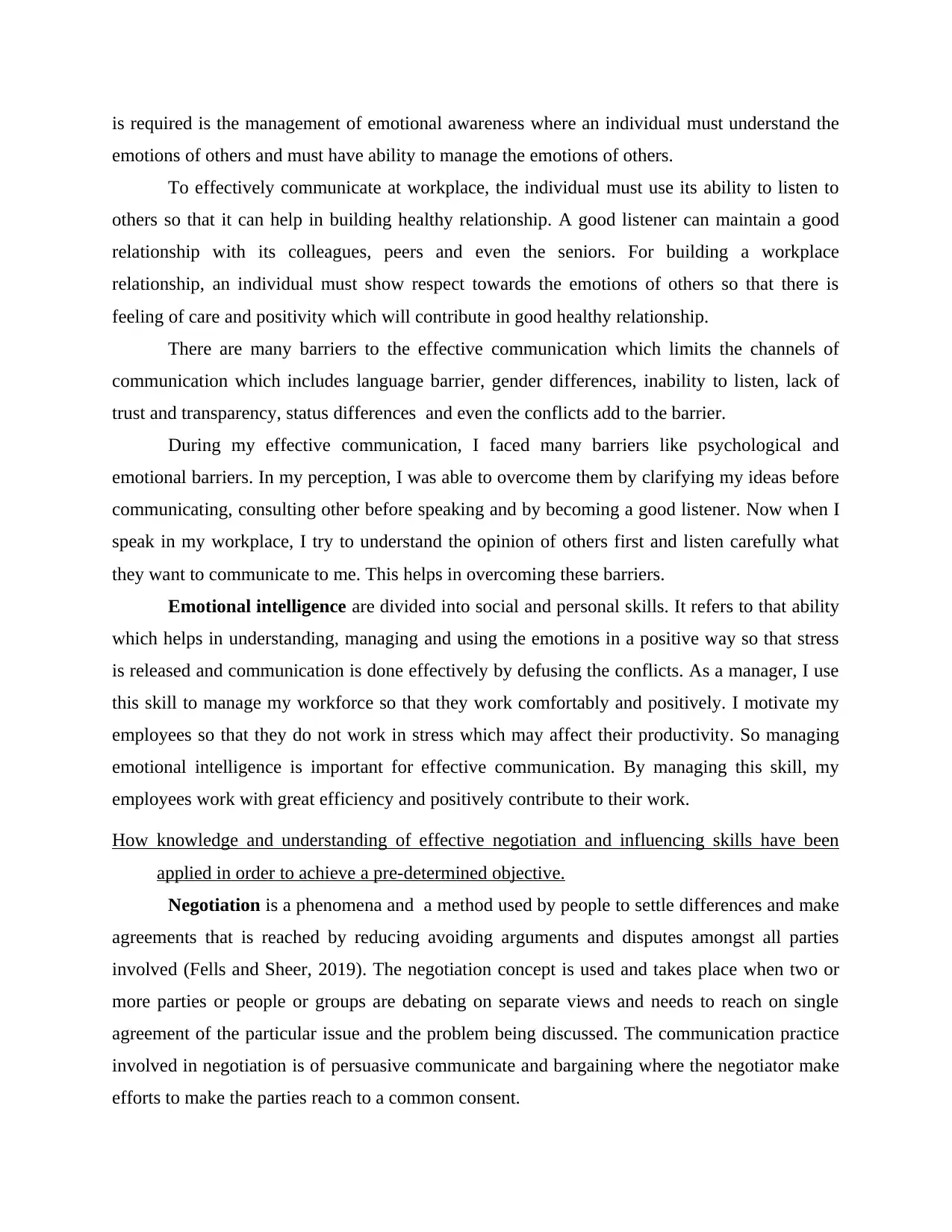
is required is the management of emotional awareness where an individual must understand the
emotions of others and must have ability to manage the emotions of others.
To effectively communicate at workplace, the individual must use its ability to listen to
others so that it can help in building healthy relationship. A good listener can maintain a good
relationship with its colleagues, peers and even the seniors. For building a workplace
relationship, an individual must show respect towards the emotions of others so that there is
feeling of care and positivity which will contribute in good healthy relationship.
There are many barriers to the effective communication which limits the channels of
communication which includes language barrier, gender differences, inability to listen, lack of
trust and transparency, status differences and even the conflicts add to the barrier.
During my effective communication, I faced many barriers like psychological and
emotional barriers. In my perception, I was able to overcome them by clarifying my ideas before
communicating, consulting other before speaking and by becoming a good listener. Now when I
speak in my workplace, I try to understand the opinion of others first and listen carefully what
they want to communicate to me. This helps in overcoming these barriers.
Emotional intelligence are divided into social and personal skills. It refers to that ability
which helps in understanding, managing and using the emotions in a positive way so that stress
is released and communication is done effectively by defusing the conflicts. As a manager, I use
this skill to manage my workforce so that they work comfortably and positively. I motivate my
employees so that they do not work in stress which may affect their productivity. So managing
emotional intelligence is important for effective communication. By managing this skill, my
employees work with great efficiency and positively contribute to their work.
How knowledge and understanding of effective negotiation and influencing skills have been
applied in order to achieve a pre-determined objective.
Negotiation is a phenomena and a method used by people to settle differences and make
agreements that is reached by reducing avoiding arguments and disputes amongst all parties
involved (Fells and Sheer, 2019). The negotiation concept is used and takes place when two or
more parties or people or groups are debating on separate views and needs to reach on single
agreement of the particular issue and the problem being discussed. The communication practice
involved in negotiation is of persuasive communicate and bargaining where the negotiator make
efforts to make the parties reach to a common consent.
emotions of others and must have ability to manage the emotions of others.
To effectively communicate at workplace, the individual must use its ability to listen to
others so that it can help in building healthy relationship. A good listener can maintain a good
relationship with its colleagues, peers and even the seniors. For building a workplace
relationship, an individual must show respect towards the emotions of others so that there is
feeling of care and positivity which will contribute in good healthy relationship.
There are many barriers to the effective communication which limits the channels of
communication which includes language barrier, gender differences, inability to listen, lack of
trust and transparency, status differences and even the conflicts add to the barrier.
During my effective communication, I faced many barriers like psychological and
emotional barriers. In my perception, I was able to overcome them by clarifying my ideas before
communicating, consulting other before speaking and by becoming a good listener. Now when I
speak in my workplace, I try to understand the opinion of others first and listen carefully what
they want to communicate to me. This helps in overcoming these barriers.
Emotional intelligence are divided into social and personal skills. It refers to that ability
which helps in understanding, managing and using the emotions in a positive way so that stress
is released and communication is done effectively by defusing the conflicts. As a manager, I use
this skill to manage my workforce so that they work comfortably and positively. I motivate my
employees so that they do not work in stress which may affect their productivity. So managing
emotional intelligence is important for effective communication. By managing this skill, my
employees work with great efficiency and positively contribute to their work.
How knowledge and understanding of effective negotiation and influencing skills have been
applied in order to achieve a pre-determined objective.
Negotiation is a phenomena and a method used by people to settle differences and make
agreements that is reached by reducing avoiding arguments and disputes amongst all parties
involved (Fells and Sheer, 2019). The negotiation concept is used and takes place when two or
more parties or people or groups are debating on separate views and needs to reach on single
agreement of the particular issue and the problem being discussed. The communication practice
involved in negotiation is of persuasive communicate and bargaining where the negotiator make
efforts to make the parties reach to a common consent.
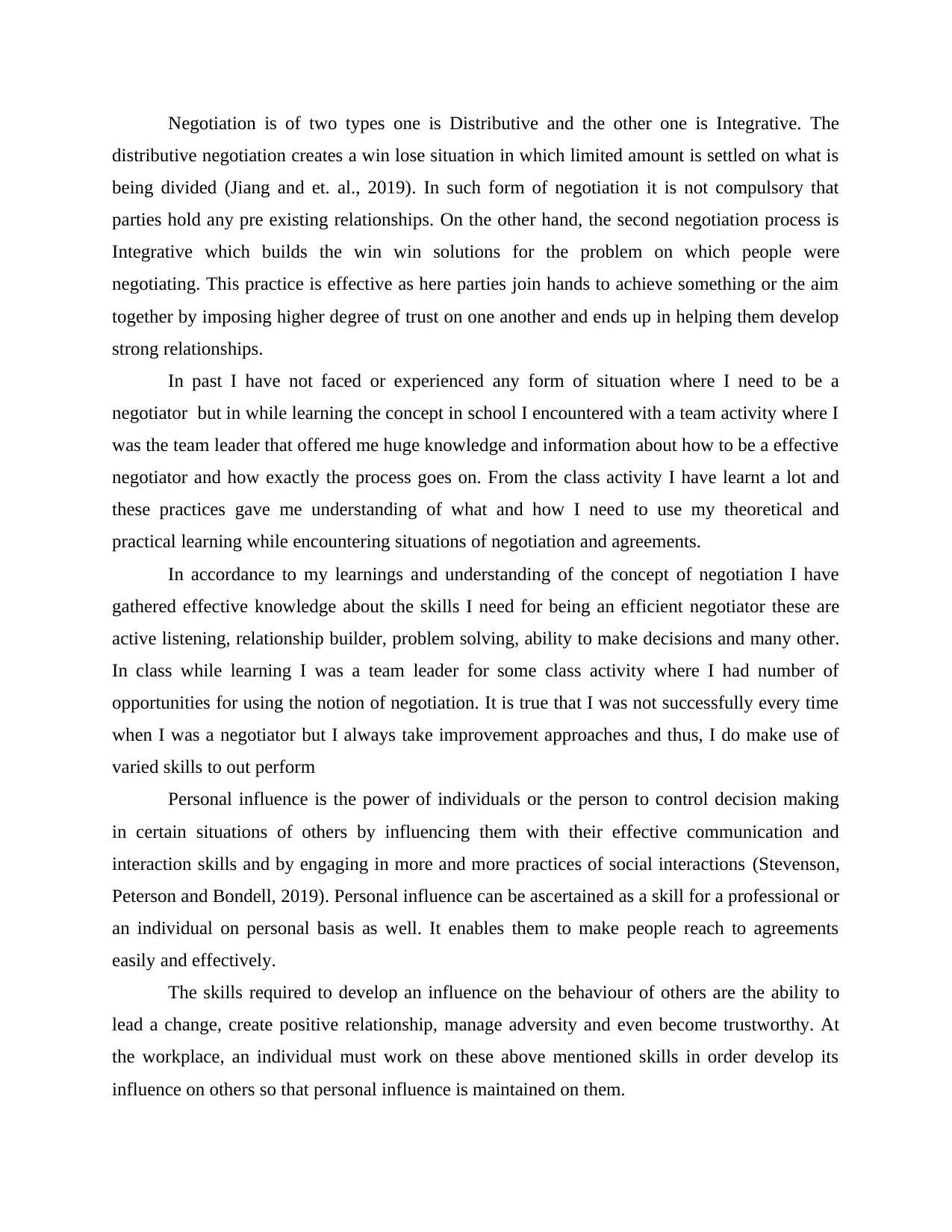
Negotiation is of two types one is Distributive and the other one is Integrative. The
distributive negotiation creates a win lose situation in which limited amount is settled on what is
being divided (Jiang and et. al., 2019). In such form of negotiation it is not compulsory that
parties hold any pre existing relationships. On the other hand, the second negotiation process is
Integrative which builds the win win solutions for the problem on which people were
negotiating. This practice is effective as here parties join hands to achieve something or the aim
together by imposing higher degree of trust on one another and ends up in helping them develop
strong relationships.
In past I have not faced or experienced any form of situation where I need to be a
negotiator but in while learning the concept in school I encountered with a team activity where I
was the team leader that offered me huge knowledge and information about how to be a effective
negotiator and how exactly the process goes on. From the class activity I have learnt a lot and
these practices gave me understanding of what and how I need to use my theoretical and
practical learning while encountering situations of negotiation and agreements.
In accordance to my learnings and understanding of the concept of negotiation I have
gathered effective knowledge about the skills I need for being an efficient negotiator these are
active listening, relationship builder, problem solving, ability to make decisions and many other.
In class while learning I was a team leader for some class activity where I had number of
opportunities for using the notion of negotiation. It is true that I was not successfully every time
when I was a negotiator but I always take improvement approaches and thus, I do make use of
varied skills to out perform
Personal influence is the power of individuals or the person to control decision making
in certain situations of others by influencing them with their effective communication and
interaction skills and by engaging in more and more practices of social interactions (Stevenson,
Peterson and Bondell, 2019). Personal influence can be ascertained as a skill for a professional or
an individual on personal basis as well. It enables them to make people reach to agreements
easily and effectively.
The skills required to develop an influence on the behaviour of others are the ability to
lead a change, create positive relationship, manage adversity and even become trustworthy. At
the workplace, an individual must work on these above mentioned skills in order develop its
influence on others so that personal influence is maintained on them.
distributive negotiation creates a win lose situation in which limited amount is settled on what is
being divided (Jiang and et. al., 2019). In such form of negotiation it is not compulsory that
parties hold any pre existing relationships. On the other hand, the second negotiation process is
Integrative which builds the win win solutions for the problem on which people were
negotiating. This practice is effective as here parties join hands to achieve something or the aim
together by imposing higher degree of trust on one another and ends up in helping them develop
strong relationships.
In past I have not faced or experienced any form of situation where I need to be a
negotiator but in while learning the concept in school I encountered with a team activity where I
was the team leader that offered me huge knowledge and information about how to be a effective
negotiator and how exactly the process goes on. From the class activity I have learnt a lot and
these practices gave me understanding of what and how I need to use my theoretical and
practical learning while encountering situations of negotiation and agreements.
In accordance to my learnings and understanding of the concept of negotiation I have
gathered effective knowledge about the skills I need for being an efficient negotiator these are
active listening, relationship builder, problem solving, ability to make decisions and many other.
In class while learning I was a team leader for some class activity where I had number of
opportunities for using the notion of negotiation. It is true that I was not successfully every time
when I was a negotiator but I always take improvement approaches and thus, I do make use of
varied skills to out perform
Personal influence is the power of individuals or the person to control decision making
in certain situations of others by influencing them with their effective communication and
interaction skills and by engaging in more and more practices of social interactions (Stevenson,
Peterson and Bondell, 2019). Personal influence can be ascertained as a skill for a professional or
an individual on personal basis as well. It enables them to make people reach to agreements
easily and effectively.
The skills required to develop an influence on the behaviour of others are the ability to
lead a change, create positive relationship, manage adversity and even become trustworthy. At
the workplace, an individual must work on these above mentioned skills in order develop its
influence on others so that personal influence is maintained on them.
⊘ This is a preview!⊘
Do you want full access?
Subscribe today to unlock all pages.

Trusted by 1+ million students worldwide
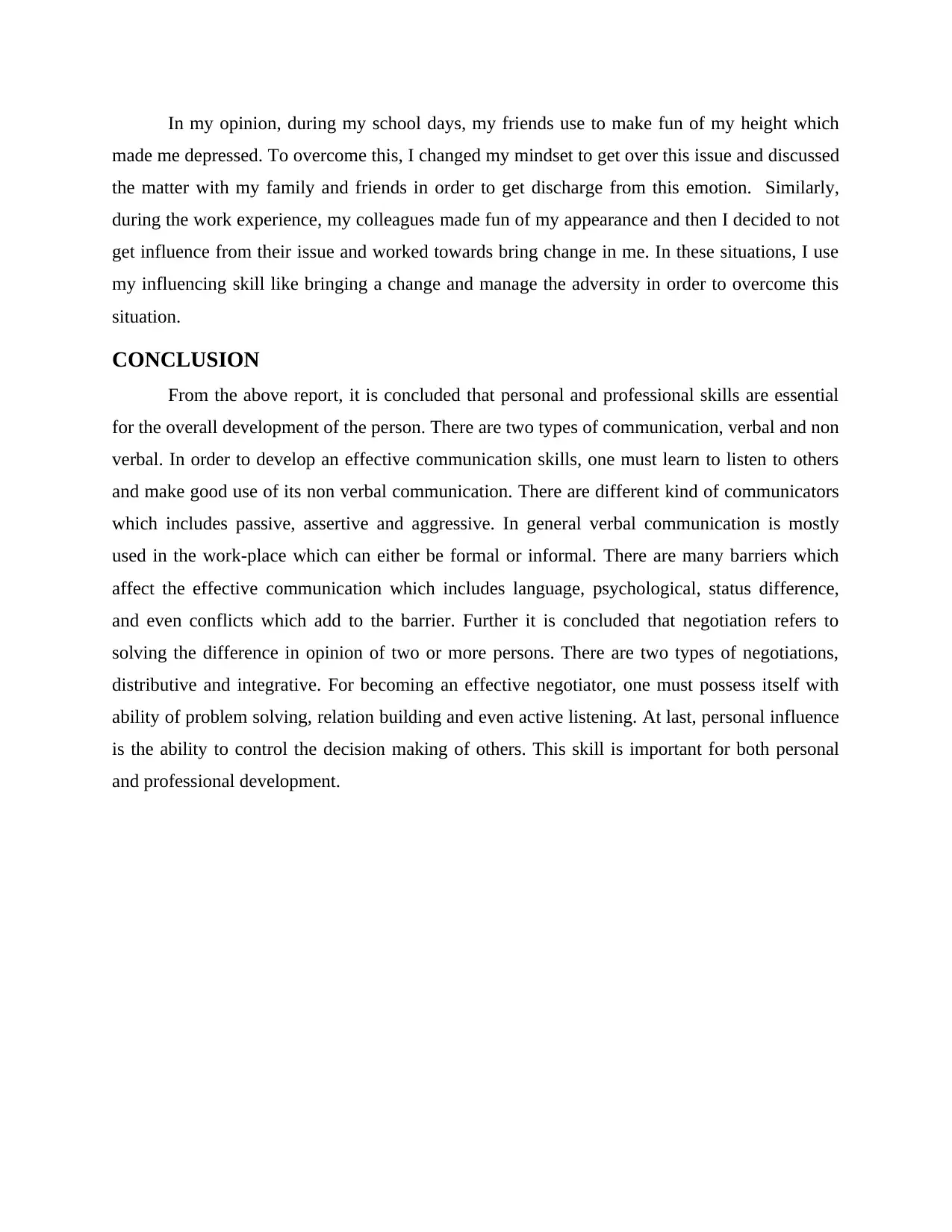
In my opinion, during my school days, my friends use to make fun of my height which
made me depressed. To overcome this, I changed my mindset to get over this issue and discussed
the matter with my family and friends in order to get discharge from this emotion. Similarly,
during the work experience, my colleagues made fun of my appearance and then I decided to not
get influence from their issue and worked towards bring change in me. In these situations, I use
my influencing skill like bringing a change and manage the adversity in order to overcome this
situation.
CONCLUSION
From the above report, it is concluded that personal and professional skills are essential
for the overall development of the person. There are two types of communication, verbal and non
verbal. In order to develop an effective communication skills, one must learn to listen to others
and make good use of its non verbal communication. There are different kind of communicators
which includes passive, assertive and aggressive. In general verbal communication is mostly
used in the work-place which can either be formal or informal. There are many barriers which
affect the effective communication which includes language, psychological, status difference,
and even conflicts which add to the barrier. Further it is concluded that negotiation refers to
solving the difference in opinion of two or more persons. There are two types of negotiations,
distributive and integrative. For becoming an effective negotiator, one must possess itself with
ability of problem solving, relation building and even active listening. At last, personal influence
is the ability to control the decision making of others. This skill is important for both personal
and professional development.
made me depressed. To overcome this, I changed my mindset to get over this issue and discussed
the matter with my family and friends in order to get discharge from this emotion. Similarly,
during the work experience, my colleagues made fun of my appearance and then I decided to not
get influence from their issue and worked towards bring change in me. In these situations, I use
my influencing skill like bringing a change and manage the adversity in order to overcome this
situation.
CONCLUSION
From the above report, it is concluded that personal and professional skills are essential
for the overall development of the person. There are two types of communication, verbal and non
verbal. In order to develop an effective communication skills, one must learn to listen to others
and make good use of its non verbal communication. There are different kind of communicators
which includes passive, assertive and aggressive. In general verbal communication is mostly
used in the work-place which can either be formal or informal. There are many barriers which
affect the effective communication which includes language, psychological, status difference,
and even conflicts which add to the barrier. Further it is concluded that negotiation refers to
solving the difference in opinion of two or more persons. There are two types of negotiations,
distributive and integrative. For becoming an effective negotiator, one must possess itself with
ability of problem solving, relation building and even active listening. At last, personal influence
is the ability to control the decision making of others. This skill is important for both personal
and professional development.
Paraphrase This Document
Need a fresh take? Get an instant paraphrase of this document with our AI Paraphraser
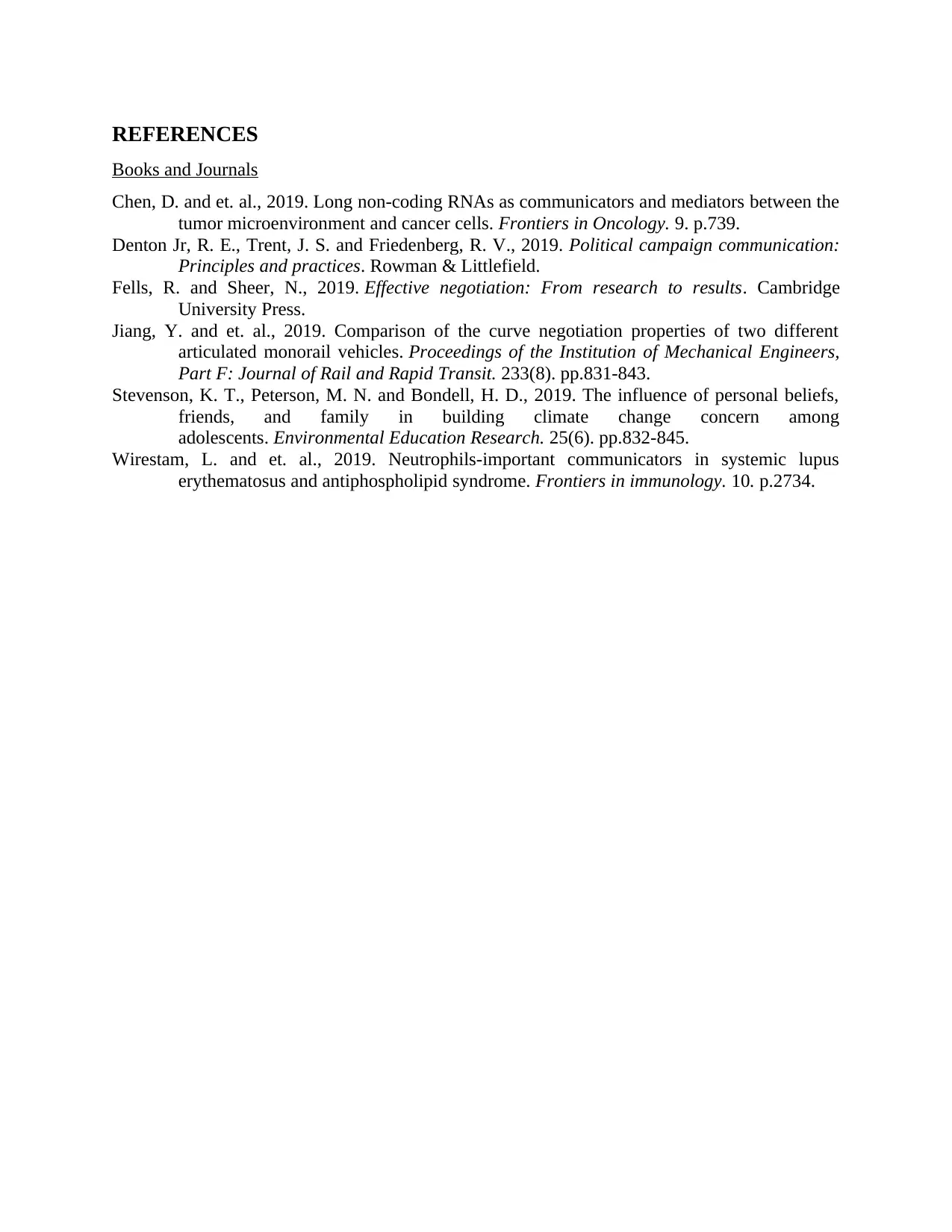
REFERENCES
Books and Journals
Chen, D. and et. al., 2019. Long non-coding RNAs as communicators and mediators between the
tumor microenvironment and cancer cells. Frontiers in Oncology. 9. p.739.
Denton Jr, R. E., Trent, J. S. and Friedenberg, R. V., 2019. Political campaign communication:
Principles and practices. Rowman & Littlefield.
Fells, R. and Sheer, N., 2019. Effective negotiation: From research to results. Cambridge
University Press.
Jiang, Y. and et. al., 2019. Comparison of the curve negotiation properties of two different
articulated monorail vehicles. Proceedings of the Institution of Mechanical Engineers,
Part F: Journal of Rail and Rapid Transit. 233(8). pp.831-843.
Stevenson, K. T., Peterson, M. N. and Bondell, H. D., 2019. The influence of personal beliefs,
friends, and family in building climate change concern among
adolescents. Environmental Education Research. 25(6). pp.832-845.
Wirestam, L. and et. al., 2019. Neutrophils-important communicators in systemic lupus
erythematosus and antiphospholipid syndrome. Frontiers in immunology. 10. p.2734.
Books and Journals
Chen, D. and et. al., 2019. Long non-coding RNAs as communicators and mediators between the
tumor microenvironment and cancer cells. Frontiers in Oncology. 9. p.739.
Denton Jr, R. E., Trent, J. S. and Friedenberg, R. V., 2019. Political campaign communication:
Principles and practices. Rowman & Littlefield.
Fells, R. and Sheer, N., 2019. Effective negotiation: From research to results. Cambridge
University Press.
Jiang, Y. and et. al., 2019. Comparison of the curve negotiation properties of two different
articulated monorail vehicles. Proceedings of the Institution of Mechanical Engineers,
Part F: Journal of Rail and Rapid Transit. 233(8). pp.831-843.
Stevenson, K. T., Peterson, M. N. and Bondell, H. D., 2019. The influence of personal beliefs,
friends, and family in building climate change concern among
adolescents. Environmental Education Research. 25(6). pp.832-845.
Wirestam, L. and et. al., 2019. Neutrophils-important communicators in systemic lupus
erythematosus and antiphospholipid syndrome. Frontiers in immunology. 10. p.2734.
1 out of 8
Related Documents
Your All-in-One AI-Powered Toolkit for Academic Success.
+13062052269
info@desklib.com
Available 24*7 on WhatsApp / Email
![[object Object]](/_next/static/media/star-bottom.7253800d.svg)
Unlock your academic potential
Copyright © 2020–2026 A2Z Services. All Rights Reserved. Developed and managed by ZUCOL.





